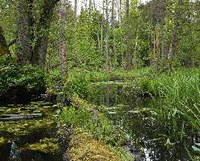(LUXEMBOURG) – Poland will have to pay a EUR 100,000 penalty per day if it continues banned logging activities in the EU-protected Bialowieza Forest, one of the last remaining primeval forests in Europe, the EU’s top court has ruled.
In 2007, the Commission designated the Natura 2000 Puszcza Bialowieska site in accordance with the Habitats Directive as a site of Community importance due to the presence of natural habitats and the habitats of certain animal and bird species. That site is also a special protection area for birds under the Birds Directive. The Bialowieza Forest is one of the best preserved natural forests in Europe, characterised by large quantities of dead wood and ancient trees, some of which are centuries old.
In response to an outbreak of Spruce Bark Beetle, in 2016, the Polish Minister for the Environment authorised an increase in logging in the Forest District of Bialowieza, as well as active forest management operations in areas previously outside the scope of such activity, such as sanitary pruning, reforestation and restoration. Work thus began on the removal of dead trees and trees affected by the Spruce Bark Beetle over an area of approximately 34 000 hectares of the Natura 2000 Puszcza Bialowieska site, which has a total surface area of 63 147 hectares.
Taking the view that those active forest management operations have a negative impact on the maintenance of favourable conservation conditions for natural habitats and the habitats of the animal and bird species whose conservation was the reason for the designation of the Natura 2000 Puszcza Bialowieska site, the Commission, on 20 July 2017, brought an action against Poland for failure to fulfil its obligations under the Habitats Directive and the Birds Directive.
The EU Court of Justices decision to adopt ‘interim actions’ and to order the immediate stop of most logging activities is a measure the court uses in very cases when there is a serious risk that ongoing activities could cause serious and irreparable damage. This decision further confirms what the European Commission, UNESCO, most of the scientific community and environmental groups have previously denounced: increased wood extraction, not a bark beetle infestation, is threatening the protected habitats and species in Bialowieza Forest, and logging must be stopped immediately before irreversible damage occurs.
The Court order was welcomed by the WWF, which said it had evidence that logging activities, banned by the Court, have been taking place, including the extraction of over-100-years dead spruces and logging in the Bialowieza Forest District.
Dariusz Gatkowski, Biodiversity Specialist at WWF Poland said:
Polish citizens, most of them against logging in Bialowieza Forest, could now start paying penalties if Polish authorities continue to ignore the official order by the European Court and all previous warnings by the European Commission and the UNESCO World Heritage Committee. The Court decision is a signal to the Polish Ministry of the Environment that disrespect for the law will not be tolerated.


